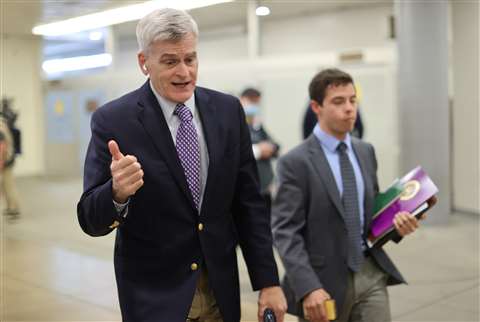
US Senate Passes $1 Trillion Infrastructure Package
Following a 69-30 vote, the United States Senate has passed a $1 trillion dollar infrastructure bill set to repair roads, bridges, airports and waterways across America.
“Big news, folks: The Bipartisan Infrastructure Deal has officially passed the Senate,” President Joe Biden said on Twitter on Tuesday. “I hope Congress will send it to my desk as soon as possible so we can continue our work of building back better.”
U.S. Senator Bill Cassidy (R-LA) talks to reporters as he walks through the Senate subway arriving for the U.S. Senate vote on the $1 trillion bipartisan infrastructure bill on Capitol Hill in Washington, U.S., August 10, 2021. REUTERS/Jonathan Ernst
The deal calls for investment of US$110 billion for roads, bridges and major infrastructure projects, US$73 billion in upgrading ageing power infrastructure, US$65 billion in broadband infrastructure for high-speed internet and US$66 billion for rail maintenance and modernization.
Also included is US$40 billion for bridge repair, replacement and rehabilitation. The White House says it would be the single, largest dedicated bridge investment since the construction of the interstate highway system, which started in the 1950s.
The deal also contains US$17.5 billion for major projects that would be too large or complex for traditional funding programs.
“The Infrastructure Investment and Jobs Act is not only a once-in-a-generation opportunity to rebuild our nation’s infrastructure, but an opportunity to restore our economic competitiveness, enhance equipment manufacturers’ ability to meet the challenges and opportunities of the 21st century, and improve the lives of all Americans,” said Kip Eideberg, senior vice president of government and industry relations, Association of Equipment Manufacturers (AEM).
AEM recently released a study that shows new potential infrastructure investments made by Congress over the next several years could create more than 100,000 family-sustaining equipment manufacturing jobs and nearly 500,000 United States manufacturing jobs overall.
The bill will now go to the House of Representatives before President Biden can sign it into law. The House is likely on break until the fall.

U.S. Senator Bill Cassidy (R-LA) talks to reporters as he walks through the Senate subway arriving for the U.S. Senate vote on the $1 trillion bipartisan infrastructure bill on Capitol Hill in Washington, U.S., August 10, 2021. REUTERS/Jonathan Ernst
 Home
Home
 Categories
Categories
 Discover
Discover
 My Machmall
My Machmall